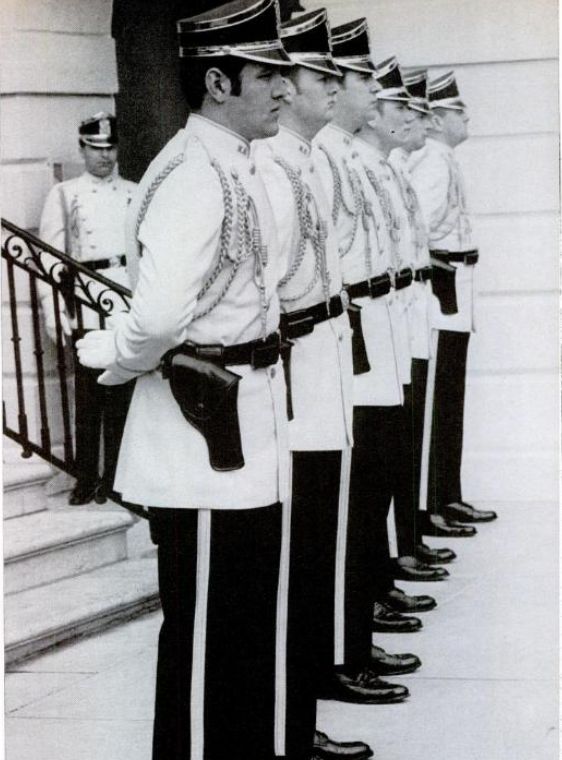General Discussion
Related: Editorials & Other Articles, Issue Forums, Alliance Forums, Region ForumsTrump would like an FBI that looked more like a "praetorian guard".
He said he wanted a "new FBI"... one that was "bigger and better".
The "Praetorian Guard" of Roman times was created to protect and defend the emperor.
The SS of Hitler was used in a similar manner.
It appears that is what Trump would prefer?
shraby
(21,946 posts)kentuck
(111,103 posts)I am sure.
atreides1
(16,079 posts)The Praetorian Guard (Latin: cohortes praetoriae) was an elite unit of the Imperial Roman Army whose members served as personal bodyguards to the Roman emperors. During the era of the Roman Republic, the Praetorians served as a small escort force for high-ranking officials such as army generals or provincial governors. With the Republic's transition into the Roman Empire, however, the first emperor Augustus founded the Guard as his personal security detail. Although they continued to serve in this capacity for roughly three centuries, the Guard became notable for its intrigue and interference in Roman politics, to the point of overthrowing emperors and proclaiming their successors. In 312 the Guard was ultimately disbanded by Constantine the Great.
Trump could find himself in the same position as Caligula...and that wasn't a pretty ending for the Imperial family!!!
dalton99a
(81,516 posts)The Praetorians were known to engage in espionage, intimidation, arrests and killings to protect the interests of the Roman emperor. For clandestine operations, they may have employed a special wing of troops known as “speculatores.” Formerly a reconnaissance corps under the Roman Republic, by the imperial era this unit had graduated to serving as couriers and intelligence operatives in the service of the Caesar. Speculatores and other members of the Praetorians would disguise themselves as ordinary citizens at gladiator contests, theatrical performances and protests to monitor and arrest anyone who criticized the emperor. They also kept tabs on suspected enemies of the state, and in some cases they even secretly executed those judged to be an imminent threat to the emperor or his policies.
The Praetorians’ may have been tasked with protecting the Roman Emperor, but they were also the single greatest threat to his life. The unit was a major player in the webs of deceit that characterized imperial Rome, and they were willing to slaughter and install new emperors when tempted by promises of money or power. Disgruntled Praetorians famously engineered the assassination of Caligula and the selection of Claudius as his successor in A.D. 41. Among others, the Guard or their prefect also played a part in the murder of Commodus in 192, Caracalla in 217, Elagabalus in 222 and Pupienus and Balbinus in 238. In some cases, the Praetorians were partially responsible for both installing andmurdering a would-be emperor. Galba ascended the throne in A.D. 68 after winning the support of the Guard, only to be killed at their hands the following year after he neglected to properly reward them. Likewise, Emperor Pertinax was confirmed by the Praetorians in 193 and then slain just three months later when he tried to force them to accept new disciplinary measures.
According to the ancient historian Cassius Dio, after murdering Emperor Pertinax in A.D. 193, the Praetorian Guard tried to cash in on the power vacuum by placing the Roman throne on the auction block. Following a brief bidding war between former consul Didius Julianus and Pertinax’s father-in-law, Titus Flavius Sulpicianus, the Praetorians reportedly sold control of the Empire to Julianus for the enormous sum of 25,000 Roman sesterces per man. The incident is one of the most notorious episodes in the unit’s history, but some historians argue that Dio’s account of an imperial “auction house” is overblown. While Julianus paid the Praetorians a fortune for their support, the Guard was equally motivated by fear that Sulpicianus would seek revenge for the killing of his son-in-law after ascending the throne. ...
Historic NY
(37,451 posts)[link: |]
|]
[link: http://www.weirduniverse.net/blog/comments/nixon_palace_guard|]
They ended up as band uniforms. People thought they looked like something the Nazis would wear.